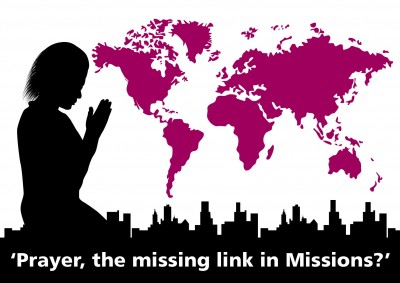Prayer as a Strategic Resource in Mission (Part 2)

Prayer can often be the missing link in our efforts on behalf of the unevangelized world. As important as good organization, planning, and strategy are in world evangelization, in our busyness for God we may have neglected to link up with His power and direction to carry out that particular part of His mission given to us. And that is a crucial omission!
While doing some research at the Fuller Seminary library, I was startled to discover amidst their sizeable holdings on missions to discover no book specifically on the subject of prayer and missions. True, there were passing references to prayer in volumes on the history of missions and the theology of missions. But the great bulk of books dealt with issues of mission strategy, organization and planning. Could this unwitting omission at one of the great schools of missiology be reflective of a more general neglect of a critical factor in the accomplishment of world evangelization?
In musing over the failure of his generation to evangelize the world by 1900, A.T. Pierson attributed this failure not only to a lack on consecration in the church evidenced by a lack of giving, faith, personal holiness, but most of all to the lack of prevailing prayer. He wrote:
"Every time the church has set herself to praying there have been stupendous movements in the mission world. If we should but transfer the stress of our dependence and emphasis from appeals to men to appeals to God-from trust in organization to trust in supplication-from confidence in methods to importunate prayer for the power of the Holy Spirit, we should see results more astounding than have yet been wrought."
"There is...too little simple looking unto that real source of success, the power of God in answer to prayer, first to open doors of access, then to raise up and thrust forth laborers and then to break down all opposition and make the truth mighty in converting, subduing, saving and sanctifying."
Participants at the Northfield Convention of 1885 expressed the same sentiment:
"But above all else our immediate and imperative need is a new spirit of earnest and prevailing prayer. The first Pentecost crowned ten days of united, continued supplication. Every subsequent advance maybe directly traced to believing prayer and upon this must depend a new Pentecost. We therefore earnestly appeal to all fellow disciples to join us and each other in importunate daily supplication for a new and mighty effusion of the Holy Spirit upon all ministers, missionaries, evangelists, pastors, teachers and Christian workers and upon the whole earth; that God would impart to all Christ's witnesses the tongues of fire and melt hard hearts before the burning message. It is not by might not by power but by the Spirit of the Lord that all true success must be secured. Let us call upon God till He answereth by fire!"
Twenty-five years later the year 1900 had come and gone. At the conclusion of the great Edinburgh Conference on Mission in 1910, Jonathan Goforth expressed his disillusionment with the missions movement for generally failing to follow through in making prayer an ongoing priority in world evangelization:
"Listening to the addresses that day one could not but conclude that the giving of the Gospel to lost mankind was largely a matter of better organization, better equipment, more men and women. Symptoms indeed were not lacking that a few more sparks might have precipitated an explosion. But no, the dethronement of the idol of ecclesiastical self-efficiency was apparently too great a price to pay....We still refuse to face the unchangeable truth that 'it is not by might nor by power, but BY MY SPIRIT.'"
Perhaps the Edinburgh Conference Report also betrays a recognition that prayer had not been given its due in the years before and after 1900: "When the church sets itself to pray with the same seriousness and strength of purpose that it has devoted to other forms of Christian effort, it will see the Kingdom of God come with power."
Whether or not prayer became a missing link in the world missions effort before and after 1900 is a question for further research. Nevertheless, we face the same danger today of falling into the trap of thinking that if we were just better organized, just better coordinated, just better deployed with our people and resources, we would be able to accomplish world evangelization. Pierson and Goforth were right. They realized that world evangelization above all is an issue to be decided by spiritual power, the power of the Holy Spirit released in response to the prayers of His people.
Arthur Matthews, the late former missionary of the China Inland Mission, put his finger on the reason that we often do not emphasize prayer enough: "The concept that treats prayer as if it were a supplemental booster in getting some project off the ground makes the project primary and the prayer secondary. Prayer was never meant to be incidental to the work of God. It is the work." Could we and other mission strategists be guilty of treating prayer as if it were a nice add-on to the other "strategic" things we are up to? Could it be that we have ignored the most strategic activity in accomplishing world evangelization? Reasons from Scripture, the history of missions and current missionary experience all compel us to contend that prayer is our most strategic resource in missions.
John Robb, IPC Chairman
(Excerpted and adapted from the article by John Robb “Prayer as a Strategic Weapon in Frontier Mission” published in the International Journal of Frontier Missiology in 1991)

